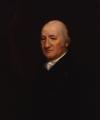Now the brown woods their leafy load resign
And rage the tempests with resistless force?
Mantled with snow the silver mountains shine,
And icy fetters chain the rivulet's course.
No pleasing object charms our wearied view,
No waving verdure decks the dreary glade,
Save that o'er yonder tomb the mournful yew
Projects an awful solitary shade.
Short is the Spring, and short the Summer hour,
And short the time that fruitful Autumn reigns;
But tedious roll the days when Winter's power
Asserts it's empire o'er our wasted plains.
As swiftly wears our Spring of life away,
As swiftly will our jolly Summer go;
But, ah! when Winter clouds our chearless day,
Again the vernal breezes never blow!
Mark this, and boast your fancied worth no more,
Ye great, ye proud, ye learned, and ye brave!
With hasty lapse some circling years are o'er,
And lo, ye slumber in the silent grave!
Why views the sage fair Pleasure's transient charm,
And all her votaries gay with scowling eye?
Alike he stoops to Fate's superior arm,
Alike he suffers, and alike must die!
Say, what avails it then with brow severe
The silken bands of Luxury to despise;
To bring by thought the day of horror near,
And view the tempest ere the clouds arise?
Better with laughing nymphs in revels gay
To give the hours to Venus, wine, and song;
And, since the rapid moments never stay,
To catch some pleasures as they glide along.
Deluded man! whom empty sounds beguile,
What transports here await thy anxious soul?
Know, love abhors the venal harlot's smile,
And hell-born fury rages in the bowl.
Seek Virtue to be blest; but seek her far,
Far from those gloomy sons of letter'd pride,
Who 'gainst the passions wage eternal war,
And, foes to Nature, Nature's dictates chide.
Let mirth, not madness, crown the temperate feast;
Let love and beauty joys refin'd impart:
Though mere sensation charm the groveling breast,
'Tis mutual passion fires the generous heart.
The various blessings bounteous Heaven bestows
With gratitude and charity repay,
Relieve thy suffering friend, or share his woes,
But from his failings turn thine eyes away.
So, when the wintry storms of death are past,
In brighter skies, and ether more serene,
Thy wither'd boughs shall bud again, to last
For ever blooming, and for ever green.
Elegy II
written byHenry James Pye
© Henry James Pye






